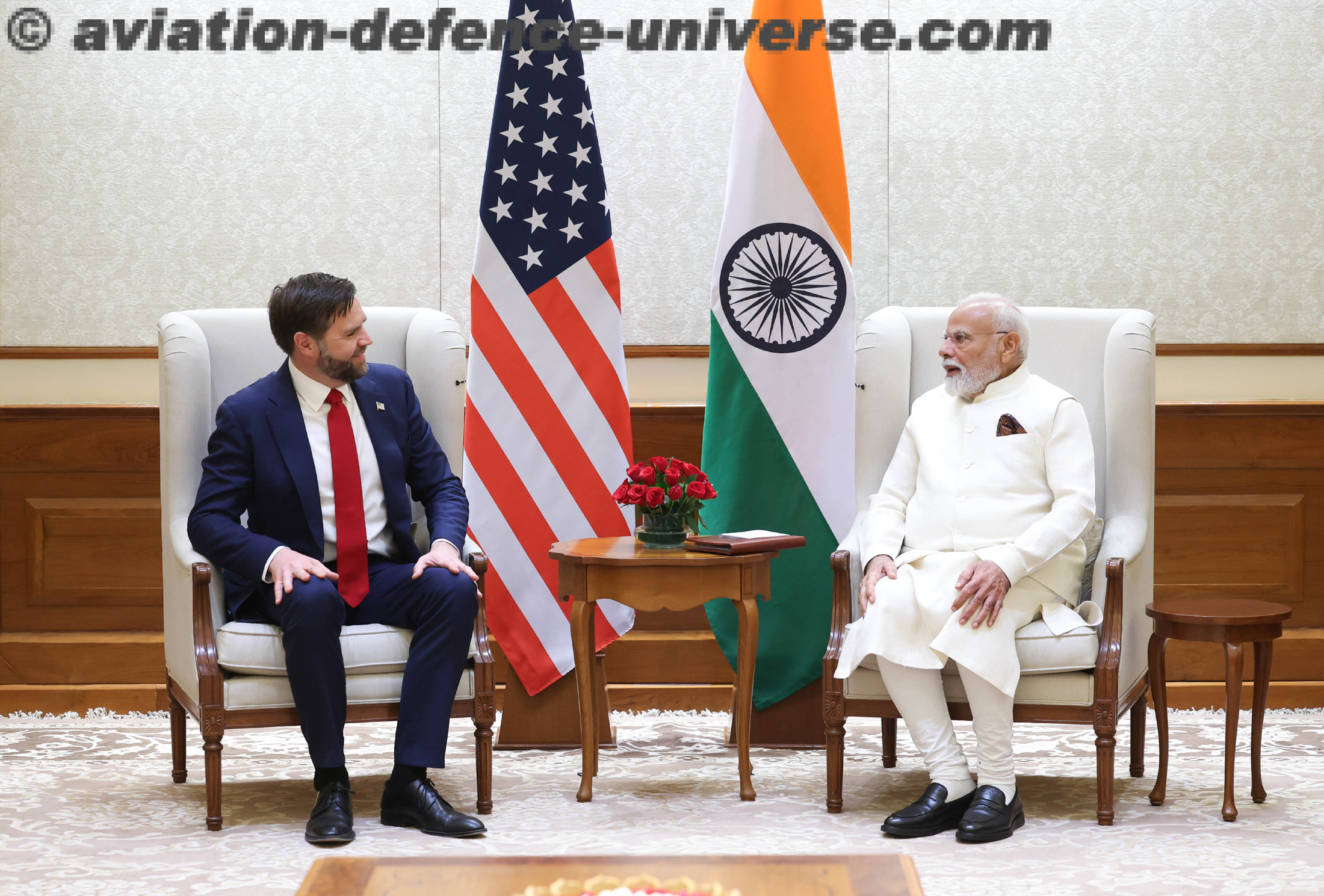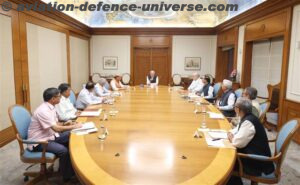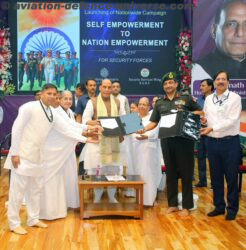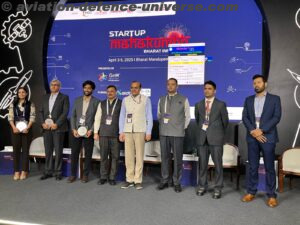- Military Doctrine to accelerate India’s Defence Space advancements, ISR Satellites in Pipeline: CDS Gen. Anil Chauhan
- CDS Gen. Anil Chauhan Urges Creation of Indian ‘Space Culture’ to Tackle Future Conflicts Beyond Earth
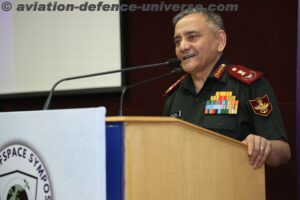 New Delhi, 7th April 2025: In an effort to boost the collaboration between the Indian space and defence sectors, the third edition of the ‘Indian DefSpace Symposium 2025’ kicked off today at Manohar Parrikar Institute for Defence Studies and Analyses (MP-IDSA), New Delhi. The Indian DefSpace Symposium being organized by Indian Space Association (ISpA) is a three-day forum to explore the latest trends, opportunities and challenges in of defence & space sectors. The event provides a unique platform to senior military officials, policymakers, industry leaders, and global experts of both defence and space sector to come together and collaborate to achieve future goals.
New Delhi, 7th April 2025: In an effort to boost the collaboration between the Indian space and defence sectors, the third edition of the ‘Indian DefSpace Symposium 2025’ kicked off today at Manohar Parrikar Institute for Defence Studies and Analyses (MP-IDSA), New Delhi. The Indian DefSpace Symposium being organized by Indian Space Association (ISpA) is a three-day forum to explore the latest trends, opportunities and challenges in of defence & space sectors. The event provides a unique platform to senior military officials, policymakers, industry leaders, and global experts of both defence and space sector to come together and collaborate to achieve future goals.
The inaugural event was graced by General Anil Chauhan, Chief of Defence Staff of India; Air Chief Marshal V.R. Chaudhari (retd.), Former Chief of the Air Staff; AVM Pawan Kumar, Director General, Defence Space Agency; Amb Sujan R. Chinoy, Director General, MP-IDSA; Jayant Patil, Chairman, ISpA; Lt. Gen. A.K. Bhatt (Retd.), Director General, ISpA and senior representatives from the Defence forces and leading global and Indian defence firms.
The first day of the symposium featured thought-provoking discussions and sessions on a range of critical topics, including Space Threat Analysis: Adversaries’ Capabilities and Emerging Geopolitical Risks, Communications: Building Secure and Resilient Defence Networks, and Beyond the Horizon: Leveraging Space-Based ISR for Multi-Domain Operations.
In the welcome address, Jayant Patil, Chairman, Indian Space Association (ISpA) said, “India’s space sector is at an inflection point, and the defence industry is playing a pivotal role in shaping its future. With the government’s push for 52 dedicated military satellites and increasing private participation, we are building a secure, Atmanirbhar space ecosystem that’s ready to meet strategic challenges head-on. The Indian industry has already delivered technologies like surveillance and communication satellites, jammers, and tracking radars, proving its capability. Going forward, collaboration between public and private sectors will be key to accelerating innovation and enhancing national security through space.”
In his inaugural speech, General Anil Chauhan, Chief of Defence Staff of India, Indian Armed Forces said, “Space is emerging as a new domain that will dominate warfare. We need to develop a ‘Space Culture’ that fosters new ideas and capabilities in space warfare. This culture is about seminal research, original doctrines, and strategies for space. It’s not just about creating startups but about institutions and societies that ideate on space warfare. As military men, we must focus on Earth’s orbital space, enhancing military capabilities and protecting these assets from threats. India has instituted reforms like the Defence Space Agency (DSA) and New Space India Limited (NSIL), fostering public-private partnerships DSA is working on bringing out a military space doctrine which hopefully should be able to get out in two or three months and we are also working on a national military space policy. Initiatives like the launch of satellites for ISR purposes in partnership with ISRO and the private industry are underway. Our strategy is clear: simulate domestic market and foster international cooperation and build up state-of-the-art infrastructure to position ourselves as a global leader in space.”
Air Chief Marshal V.R. Chaudhari (retd.), Former Chief of the Air Staff said, “With satellites shrinking in size but growing in capability, we’re witnessing a strategic shift from large satellites to proliferated, resilient constellations across multiple orbits. India must now seize the opportunity to lead in launch-on-demand capabilities, space-based 5G networks, onboard edge processing, and even quantum communications. In today’s complex and contested space environment, where the line between civilian and military use is blurring, resilience, collaboration, and innovation are no longer optional — they are imperative. The private sector and startups, with support from platforms like ISpA, will be key drivers in building India’s secure and self-reliant space future.”
AVM Pawan Kumar, Director General, Defence Space Agency said, “India’s defence space vision is a convergence of strategic necessity, technological innovation, economic opportunity, and collaborative ambition. With a clear decadal roadmap focused on ISR, PNT, secure communication, space weather, and space situational awareness, we are developing persistent surveillance systems, software-defined payloads, encrypted platforms—including post-quantum solutions—and resilient regional navigation networks. These are not isolated technologies, but mission-driven capabilities vital to both defence and civil domains. This ecosystem must remain user-driven—guided by the operational realities of our armed forces. As 80% of defence space data is consumed by the strategic community, their involvement in shaping requirements and testing systems is critical. Our approach must blend speed with security, innovation with integration.”
Amb Sujan R. Chinoy, Director General, MP-IDSA said, “India must evolve a robust space doctrine that balances deterrence with disruption, ensuring we can defend our assets while denying adversaries the use of theirs. Technologies like AI, quantum computing, hypersonic systems, and more, are redefining the rules of warfare, and India must be ahead of the curve. We must build survivable, scalable, and dual-use capabilities where satellites not only gather ISR data but are resilient against jamming, hacking, or kinetic threats. However, dominance in this domain won’t be achieved by state efforts alone. The future lies in synergy between ISRO, DRDO, the Defence Space Agency, and a vibrant private sector empowered by IN-SPACe. Innovation must come from agile startups, established tech firms, and academia working in tandem with our armed forces.”
Lt. Gen. A.K. Bhatt (Retd.), Director General, Indian Space Association (ISpA) said, “India’s private space sector has demonstrated remarkable innovation with minimal financial support, from launching hyperspectral satellites to building space domain awareness capabilities. As weaponization of space becomes a reality, we must collectively evolve from the complicated to the complex. The roadmap is clear: empower startups, integrate space into defense planning, and enable robust partnerships to build a future-ready space ecosystem.”
Under the theme “Securing the Space Domain: Collaboration, Capabilities, and Strategic Vision”, the three-day forum will focus on the latest technological advancements, emerging threats, and policy frameworks that define modern defence space strategies. IDS 2025 is expected to witness over 500 participants, 60+ speakers, 100+ organizations and facilitate high-level discussions on key topics, including space-based intelligence, surveillance and reconnaissance (ISR), secure communications, cyber security in space, propulsion systems, and quantum technologies.


















